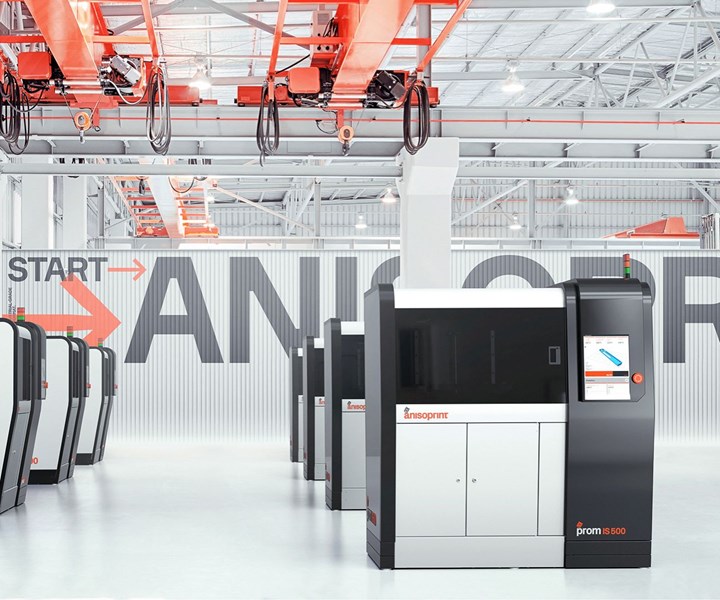Anisoprint Launches ProM IS 500 Industrial 3D Printer
ProM IS 500 is said to be the first industrial printer for continuous fiber-reinforced high-temperature plastics.

Anisoprint has launched the ProM IS 500, which is said to be the first industrial 3D printer specifically designed to print high-temperature thermoplastics with continuous fiber reinforcement.
The ProM IS 500 offers precise, repeatable and reliable manufacturing of mid-sized composite parts with a build volume of 600 × 420 × 300 mm. The ProM IS 500 is equipped with a heated chamber for printing high-temperature polymers such as polyetheretherketone (PEEK) or polyethylenimine (PEI), and features automated calibration, material and print quality controls and high-precision motion control. The machine also supports industrial interfaces and safety requirements.
Based on Anisoprint’s patented Composite Fiber Co-extrusion (CFC) technology, the ProM IS 500 allows for professional-level printing of anistropic composites while its basics can be learned from the company’s desktop continuous fiber 3D printer, Composer, also based on CFC technology.
Anisoprinting technology enables manufacturing of complex-shaped composite parts without tools or molds. Due to the ability to apply fibers in topology-optimized lattices, the maximum properties of unidirectional composites are possible while spending the minimum of material for the expected loads. This significantly reduces weight, production time and part cost. Anisoprint says ProM IS 500 will replace traditional technologies and materials for manufacturing mid-sized tools, spare parts and functional prototypes for various industries.
ProM IS 500 will have up to four changeable print heads for printing composites and pure plastic, enabling the reinforcement of different zones of the part with different composites.
High-temperature plastics such as PEEK and PEI are expected to be available as matrix materials for composites anisoprinted on ProM IS 500.
Related Content
-
Evaluating the Printability and Mechanical Properties of LFAM Regrind
A study conducted by SABIC and Local Motors identified potential for the reuse of scrap reinforced polymer from large-format additive manufacturing. As this method increases in popularity, sustainable practices for recycling excess materials is a burgeoning concern.
-
Robot Vs. Gantry for Large-Format Additive Manufacturing (Includes Video)
Additive Engineering Solutions, specialist at 3D printing very large parts and tools on gantry machines, now also uses a robot for large-format AM. Here is how the robot compares.
-
Eaton Developing Carbon-Reinforced PEKK to Replace Aluminum in Aircraft Air Ducts
3D printable material will meet ESD, flammability and other requirements to allow for flexible manufacturing of ducts, without tooling needed today.













